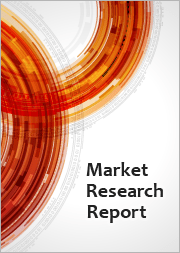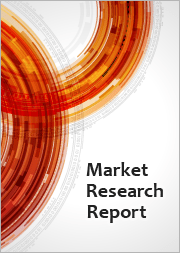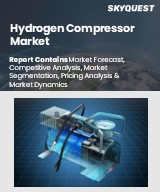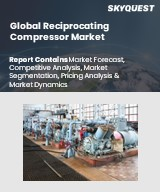
|
시장보고서
상품코드
1800182
자동 윤활 시스템 시장 예측(2025-2030년)Automatic Lubrication System Market - Forecasts fom 2025 to 2030 |
||||||
자동 윤활 시스템 시장은 CAGR 4.95%를 나타내 2025년 10억 5,000만 달러에서 2030년에는 13억 3,700만 달러로 성장할 것으로 예측됩니다.
세계의 자동 윤활 시스템 시장은 집중윤활시스템 시장으로도 알려져 있으며, 산업 자동화에 대한 투자 증가와 장기적인 비용효과에 대한 주목을 통해 강력한 성장을 이루고 있습니다. 이 시스템은 작동 중에 정확한 양의 윤활유를 기계에 공급하여 장비의 수명과 작동 효율을 향상시킵니다. 자동화된 시스템은 수작업 개입과 관련된 위험을 줄이기 때문에 작업자의 안전이 중요해지고 수요가 더욱 높아지고 있습니다. 그러나 자동 윤활 시스템의 장점에 대한 최종 사용자의 인식이 제한적이라는 것이 과제가 되고 예측 기간 동안 시장 성장을 억제할 수 있습니다. 이러한 상황에도 불구하고 시장은 특히 산업활동이 활발하고 정책이 지지되는 지역에서 확대를 향하고 있습니다.
주요 성장 요인
산업 자동화에 대한 투자
산업 자동화의 급증은 자동 윤활 시스템 시장의 주요 촉진요인입니다. 이 시스템은 중요한 기계 부품의 일관된 윤활을 보장하고, 마모 및 손상을 줄이고, 가동 중지 시간을 최소화하고, 유지 보수 비용을 절감합니다. 생산성을 높이기 위해 자동화를 채택하는 산업이 늘어남에 따라 신뢰할 수 있는 윤활 솔루션에 대한 수요가 증가하고 있으며, 자동화 시스템은 현대 산업 운영에 필수적인 요소가 되고 있습니다.
근로자의 안전에 중점
자동 윤활 시스템은 위험한 환경에서 수작업의 필요성을 제거하여 작업자의 안전성 향상에 기여합니다. 펌프 및 모터와 같은 움직이는 부품에 윤활유공급을 자동화함으로써 이러한 시스템은 사고나 위험한 기계에 노출되는 위험을 줄입니다. 이 안전상의 이점은 특히 직장의 안전기준을 우선하는 부문을 중심으로 각 업계에서 채용이 진행되고 있습니다.
목차
제1장 주요 요약
제2장 시장 현황
- 시장 개요
- 시장 정의
- 조사 범위
- 시장 세분화
제3장 비즈니스 상황
- 시장 성장 촉진요인
- 시장 성장 억제요인
- 시장 기회
- Porter's Five Forces 분석
- 업계 밸류체인 분석
- 정책 및 규정
- 전략적 제안
제4장 기술 전망
제5장 자동 윤활 시스템 시장 : 윤활 유형별
- 서론
- 그리스
- 오일
제6장 자동 윤활 시스템 시장 : 기술별
- 서론
- 단일 라인
- 듀얼 라인
- 멀티 라인
- 스프레이
- 기타
제7장 자동 윤활 시스템 시장 : 업계별
- 서론
- 에너지 및 전력
- 석유 및 가스
- 제조
- 건설
- 자동차
- 기타
제8장 자동 윤활 시스템 시장 : 지역별
- 서론
- 북미
- 미국
- 캐나다
- 멕시코
- 남미
- 브라질
- 아르헨티나
- 기타
- 유럽
- 독일
- 프랑스
- 영국
- 스페인
- 기타
- 중동 및 아프리카
- 사우디아라비아
- 아랍에미리트(UAE)
- 기타
- 아시아태평양
- 중국
- 인도
- 일본
- 한국
- 인도네시아
- 태국
- 기타
제9장 경쟁 환경과 분석
- 주요 기업과 전략 분석
- 시장 점유율 분석
- 합병, 인수, 합의 및 협업
- 경쟁 대시보드
제10장 기업 프로파일
- Can-Serv, Inc.
- Interlube Limited(Subsidiary of The Timken Company)
- Cenlub Systems
- Valin Corporation
- Groeneveld Lubrication Solutions
- Graco, Inc.
- Lincoln Industrial Corporation
- JSG Industrial Systems Pty Ltd(Subsidiary of John Sample Group)
- SKF
- Dropsa
제11장 부록
- 통화
- 전제조건
- 기준연도과 예측연도의 타임라인
- 이해 관계자에게 있어서의 주요 이점
- 조사 방법
- 약어
The automatic lubrication system market is expected to grow from USD 1.050 billion in 2025 to USD 1.337 billion in 2030, at a CAGR of 4.95%.
The global automatic lubrication system market, also known as the centralized lubrication system market, is experiencing robust growth driven by increasing investments in industrial automation and a focus on long-term cost-effectiveness. These systems deliver precise amounts of lubricants to machinery during operation, enhancing equipment longevity and operational efficiency. The growing emphasis on worker safety further fuels demand, as automated systems reduce manual intervention and associated risks. However, limited awareness of the benefits of automatic lubrication systems among end users remains a challenge, potentially restraining market growth over the forecast period. Despite this, the market is poised for expansion, particularly in regions with strong industrial activity and supportive policies.
Key Growth Drivers
Industrial Automation Investments
The surge in industrial automation is a primary driver of the automatic lubrication system market. These systems ensure consistent lubrication of critical machinery components, reducing wear and tear, minimizing downtime, and lowering maintenance costs. As industries increasingly adopt automation to enhance productivity, the demand for reliable lubrication solutions continues to rise, positioning automatic systems as a vital component in modern industrial operations.
Focus on Worker Safety
Automatic lubrication systems contribute to improved worker safety by eliminating the need for manual lubrication in hazardous environments. By automating the delivery of lubricants to moving parts such as pumps and motors, these systems reduce the risk of accidents and exposure to dangerous machinery. This safety benefit is driving adoption across industries, particularly in sectors prioritizing workplace safety standards.
Market Segmentation
By Industry Vertical
The automatic lubrication system market is segmented into energy and power, oil and gas, manufacturing, construction, automotive, and other sectors. The automotive industry remains a key adopter, utilizing these systems for lubricating pumps, electric motors, and other components to support factory automation and meet rising vehicle production demands. The energy and power sector is expected to grow significantly, driven by investments in renewable energy, where automatic lubrication systems enhance the reliability and lifespan of critical equipment.
By Geography
The market is segmented into North America, South America, Europe, the Middle East and Africa, and Asia-Pacific. Europe and North America maintain significant market shares due to their early adoption of advanced technologies and strong focus on factory automation. These regions prioritize extending the lifespan of critical wear parts to reduce operating costs, driving demand for automatic lubrication systems. The Asia-Pacific region is projected to experience impressive growth, fueled by favorable government policies promoting manufacturing and increasing industrial output, particularly in countries with expanding industrial bases.
Competitive Landscape
Key players in the automatic lubrication system market include Can-Serv, Inc., Interlube Limited (a subsidiary of The Timken Company), Cenlub Systems, Valin Corporation, Groeneveld Lubrication Solutions, and Graco, Inc. These companies drive market growth through innovation, strategic partnerships, and the development of advanced lubrication solutions tailored to diverse industrial needs.
The automatic lubrication system market is set for strong growth, propelled by the rise in industrial automation, a focus on worker safety, and increasing manufacturing output, particularly in Asia-Pacific. While limited awareness poses a challenge, the benefits of cost-effectiveness and equipment longevity continue to drive adoption across industries like automotive and energy. With key players innovating and regions like Europe, North America, and Asia-Pacific leading the way, automatic lubrication systems are becoming integral to efficient and safe industrial operations.
Key Benefits of this Report:
- Insightful Analysis: Gain detailed market insights covering major as well as emerging geographical regions, focusing on customer segments, government policies and socio-economic factors, consumer preferences, industry verticals, and other sub-segments.
- Competitive Landscape: Understand the strategic maneuvers employed by key players globally to understand possible market penetration with the correct strategy.
- Market Drivers & Future Trends: Explore the dynamic factors and pivotal market trends and how they will shape future market developments.
- Actionable Recommendations: Utilize the insights to exercise strategic decisions to uncover new business streams and revenues in a dynamic environment.
- Caters to a Wide Audience: Beneficial and cost-effective for startups, research institutions, consultants, SMEs, and large enterprises.
What do businesses use our reports for?
Industry and Market Insights, Opportunity Assessment, Product Demand Forecasting, Market Entry Strategy, Geographical Expansion, Capital Investment Decisions, Regulatory Framework & Implications, New Product Development, Competitive Intelligence
Report Coverage:
- Historical data from 2020 to 2024 & forecast data from 2025 to 2030
- Growth Opportunities, Challenges, Supply Chain Outlook, Regulatory Framework, and Trend Analysis
- Competitive Positioning, Strategies, and Market Share Analysis
- Revenue Growth and Forecast Assessment of segments and regions including countries
- Company Profiling (Strategies, Products, Financial Information, and Key Developments among others.
Segmentation
The automatic lubrication system market has been analyzed through the following segments:
By Lubrication Type
- Grease
- Oil
By Technology
- Single- Line
- Dual- Line
- Multi-Line
- Spray
- Others
By Industry Vertical
- Energy and Power
- Oil and Gas
- Manufacturing
- Construction
- Automotive
- Others
By Geography
- North America
- USA
- Canada
- Mexico
- South America
- Brazil
- Argentina
- Others
- Europe
- Germany
- France
- United Kingdom
- Spain
- Others
- Middle East and Africa
- Saudi Arabia
- UAE
- Others
- Asia Pacific
- China
- India
- Japan
- South Korea
- Indonesia
- Thailand
- Others
TABLE OF CONTENTS
1. EXECUTIVE SUMMARY
2. MARKET SNAPSHOT
- 2.1. Market Overview
- 2.2. Market Definition
- 2.3. Scope of the Study
- 2.4. Market Segmentation
3. BUSINESS LANDSCAPE
- 3.1. Market Drivers
- 3.2. Market Restraints
- 3.3. Market Opportunities
- 3.4. Porter's Five Forces Analysis
- 3.5. Industry Value Chain Analysis
- 3.6. Policies and Regulations
- 3.7. Strategic Recommendations
4. TECHNOLOGICAL OUTLOOK
5. AUTOMATIC LUBRICATION SYSTEM MARKET BY LUBRICATION TYPE
- 5.1. Introduction
- 5.2. Grease
- 5.3. Oil
6. AUTOMATIC LUBRICATION SYSTEM MARKET BY TECHNOLOGY
- 6.1. Introduction
- 6.2. Single- Line
- 6.3. Dual- Line
- 6.4. Multi-Line
- 6.5. Spray
- 6.6. Others
7. AUTOMATIC LUBRICATION SYSTEM MARKET BY INDUSTRY VERTICAL
- 7.1. Introduction
- 7.2. Energy and Power
- 7.3. Oil and Gas
- 7.4. Manufacturing
- 7.5. Construction
- 7.6. Automotive
- 7.7. Others
8. AUTOMATIC LUBRICATION SYSTEM MARKET BY GEOGRAPHY
- 8.1. Introduction
- 8.2. North America
- 8.2.1. USA
- 8.2.2. Canada
- 8.2.3. Mexico
- 8.3. South America
- 8.3.1. Brazil
- 8.3.2. Argentina
- 8.3.3. Others
- 8.4. Europe
- 8.4.1. Germany
- 8.4.2. France
- 8.4.3. United Kingdom
- 8.4.4. Spain
- 8.4.5. Others
- 8.5. Middle East and Africa
- 8.5.1. Saudi Arabia
- 8.5.2. UAE
- 8.5.3. Others
- 8.6. Asia Pacific
- 8.6.1. China
- 8.6.2. India
- 8.6.3. Japan
- 8.6.4. South Korea
- 8.6.5. Indonesia
- 8.6.6. Thailand
- 8.6.7. Others
9. COMPETITIVE ENVIRONMENT AND ANALYSIS
- 9.1. Major Players and Strategy Analysis
- 9.2. Market Share Analysis
- 9.3. Mergers, Acquisitions, Agreements, and Collaborations
- 9.4. Competitive Dashboard
10. COMPANY PROFILES
- 10.1. Can- Serv, Inc.
- 10.2. Interlube Limited (Subsidiary of The Timken Company)
- 10.3. Cenlub Systems
- 10.4. Valin Corporation
- 10.5. Groeneveld Lubrication Solutions
- 10.6. Graco, Inc.
- 10.7. Lincoln Industrial Corporation
- 10.8. JSG Industrial Systems Pty Ltd (Subsidiary of John Sample Group)
- 10.9. SKF
- 10.10. Dropsa
11. APPENDIX
- 11.1. Currency
- 11.2. Assumptions
- 11.3. Base and Forecast Years Timeline
- 11.4. Key Benefits for the Stakeholders
- 11.5. Research Methodology
- 11.6. Abbreviations






